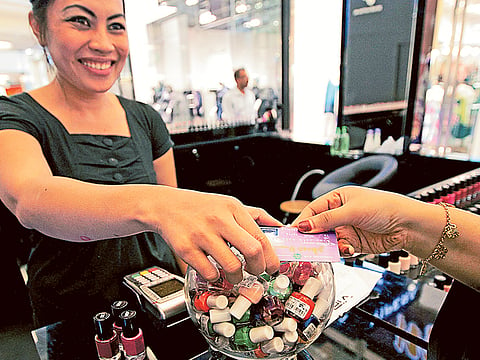Shop around to get most out of credit cards
Credit cards are most expensive form of debt due to high interest rates

Abu Dhabi: Having a credit card comes with a lot of risks, not least of which is that they can lead to a vicious cycle of debt. Finance experts, thus, recommend that consumers shop around before obtaining a credit card in order to find the right benefits and lowest interest rates.
Incentives such as airmiles and store points can prove to be highly valuable and well worth the time it takes to browse different banks to know about their credit card offerings.
Consumers should also make sure they read the small print that comes with credit cards to understand the fees and penalties associated with the card, as even one late payment can soar.
Stuart Ritchie, a chartered financial practitioner and wealth manager at AES International, said it was also important to consider the interest rate charged by the card provider, and the credit limit.
The limit should be high enough for the card to be useful but not too high to trigger payment problems.
“The most important thing to consider is what the card is to be used for. We always recommend clients truly understand their spending habits so that they can be sure to match spending with the right payment method. All too often, credit cards become a sort of financial life support, and [they] can have similarly tragic consequences if matters get out of hand,” Ritchie said.
Most expensive form of debt
Credit cards, although readily available, are just about the most expensive form of debt especially as they carry high interest rates that will cause the debt to only get larger over time.
“Used sensibly and managed carefully, credit cards give consumers access to spending power that can be extremely valuable. But the ease with which they are offered reflects the value they generate for their issuers, so be careful and never allow yourself to get into a position where you can’t meet your repayment obligations,” Ritchie said.
Average consumer debt in the UAE stands at $95,000 (Dh348,650) per household or $114 billion in total, with excessive use of credit cards and personal loans being the greatest perpetrator of severe debt, according to a recent study by Strategic Analysis, a research firm.
Usman Arif, vice president — UAE at American Express Middle East, said consumers should also consider where and when they will use a credit card — whether it’s on a daily basis or only when abroad or only in emergencies.
“When choosing a card, you need to also think about the way you manage your personal finances. Perhaps you pay off your debt each month and are comfortable with no preset spending limits. Or maybe you would benefit from set spending limits to help manage your spending,” he said.
Arif pointed that while having the ability to borrow money when needed gives people flexibility, it also comes with risks. If you borrow more than you can re-pay or don’t make payments on time, you will lose money on late fees, he said.
Similarly, Tim Searle, chairman of Globaleye, a wealth management firm, said individuals should consider whether they need to have a credit card in the first place before getting one.
Secure debt methods
“If you need to raise money, then it’s much cheaper to do it through secure debt methods, i.e. taking a loan against an asset, but because credit cards are unsecured, that means the interest rate is much higher.
If you do need to get a credit card, shop around — try to find the one with the lowest APR (annual percentage rate), or maybe if it doesn’t have the lowest APR, it has a benefits package that is attractive to you,” he said.
Searle said that most credit card providers today secure themselves with a blank cheque, which is presented to users who are unable to pay back their cards. This can then lead to a civil case and possibly custodial sentence.
“Credit cards should be — and this is what they’re designed for — short-term financing. You don’t use them for the long-term because the amount of interest you’re going to pay over the long term will get you to situation where you’re just paying off interest every month and you’ll never be able to do it. Having multiple cards is just increasing your debts,” he said.
For those who do find themselves in debt, however, finance advisers said the best way to handle it was to follow a plan and ensure they are not taking additional loans to pay for current ones.
What to consider when getting a credit card
1. Credit card limit: It should be high enough for the card to be useful but too high that it can trigger payment problems or excessive spending.
2. Interest rate: Shop around until you find the lowest rate available by card providers.
3. Small print: More often than not, the small print is tossed away, but it can have critical information on fees and penalties associated with late payments.
4. Benefits package: Many cards come with benefits like airmiles and store credit. Shop around for the package that best suits your needs.
5. Where and when you will use the card: If you’re using a card only when abroad, find a card that doesn’t charge high interest rate on international transactions. Every card has different characteristics related to usage.
6. Whether you need a card in the first place: Often times, it’s easier to raise money through secure debt methods like taking a loan against an asset
Sign up for the Daily Briefing
Get the latest news and updates straight to your inbox



